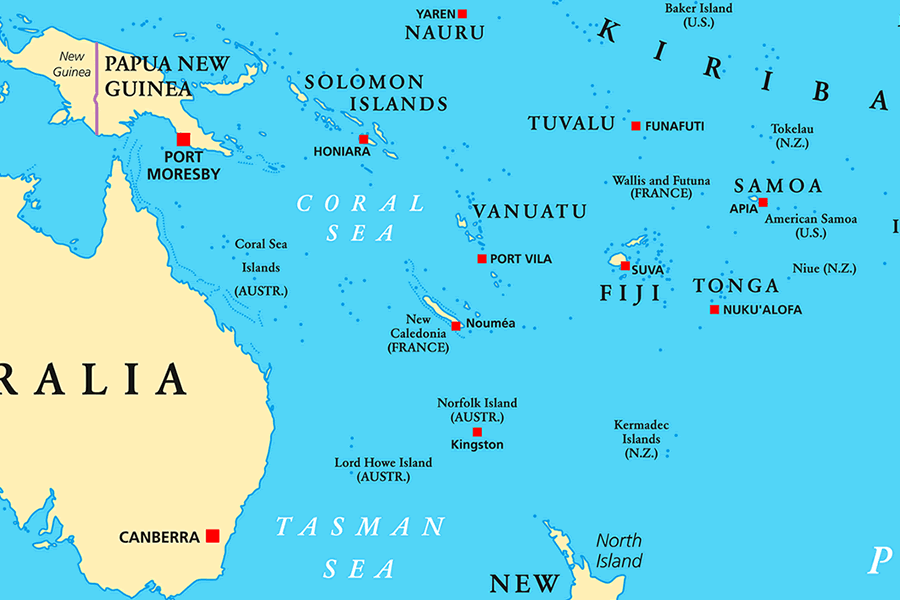Last month, a tiny island nation in the Pacific Ocean took a giant step for mankind.
Vanuatu, an archipelago of islands, like many other countries in the Indo-Pacific such as Fiji, Sri Lanka, Maldives, and Madagascar, is vulnerable to the ravages of extreme climate changes. The rising sea levels triggered by global environmental pollution and rising temperatures might make some islands vanish altogether.
Vanuatu proposed a climate justice resolution, co-sponsored by 120 countries—excluding the US—which was adopted by the UN General Assembly by consensus. The resolution would allow climate-threatened countries or activist groups to secure an advisory opinion from the International Court of Justice (ICJ) regarding the obligation of various nations about mitigating the climate crisis under the 2015 Paris Climate Accord.
Although ICJ’s advisory opinion would be non-binding, it would highlight the accountability of polluting nations and energize climate activist organizations for further global actions including litigations in domestic courts.
Just consider the confusing and contradictory policies of the Biden administration, which is vociferously committed to environmental protection and increased production of clean energy. Its landmark achievement, the Inflation Reduction Act is clearly focused on climate change, which the US Environmental Protection Agency touted as “the most significant climate legislation in US history, offering funding, programs, and incentives to accelerate the transition to a clean energy economy and will likely drive significant deployment of new clean electricity resources.”
Nevertheless, the Biden administration did not hesitate to open for auction 73.3 million acres of the Gulf of Mexico for oil and gas drilling as well as the multi-billion-dollar Willow Oil and Gas project in Alaska—another “carbon bomb,” apart from the existing Permian Basin in the Texas-Mexico region. President Biden took this action despite his 2020 campaign promise “banning new oil and gas permitting on public lands and waters.”
Ironically, President Biden’s action came just after the UN’s International Panel on Climate Change (IPCC) final report that warned of the “known unknowns” including the “likelihood and risks of unavoidable, irreversible or abrupt changes.”
Based on scientific evidence and with a high level of confidence, the report says, “There is a rapidly closing window of opportunity to secure a liveable and sustainable future for all…The choices and actions implemented in this decade will have impacts now and for thousands of years.” The report admonishes that the expansion of fossil fuel projects must be stopped and phased out. Renewables and green technology projects alone would not solve the climate crisis.
However, some eminent scholars think that free global trade in green technology products is a viable solution for a clean green future. Gordon Hanson of Harvard Kennedy School and Matthew Slaughter of Tuck School of Business have argued in Foreign Affairs that to save the world from climate disaster, we must “trade free or die.” The climate inaction of governments has already done immense damage, which is “palpable and irreversible.” Nevertheless, we cannot give up simply because there’s no choice, they say.
A free trade agreement for green technology under the auspices of the World Trade Organization similar to the Information Technology Agreement (1996), which increased productivity and created jobs all over the world, would go a long way to solve the problem, the scholars argue. This would require three pillars including free global trade in green-tech products, investment in environmental industries, and a robust policy of immigration of skilled workers.
To solve the climate crisis, they argue that the world needs another Operation Warp Speed, which in a short time of 18 months created Covid-19 vaccines. In the new incarnation of OWS, countries would purchase the most promising technologies for carbon capture, grid digitization, and electrification from anywhere regardless of the origin. The eminent scholars use the Apple smartphone as a metaphor: designed in America, manufactured in Taiwan, and assembled in China.
Their classical argument for the globalization of climate technology based on IAT and Operation Warp Speed model does not consider the changed geopolitical situation: the China-Russia alliance to replace the liberal world order with their authoritarian model and the West’s determined multi-dimensional response, diplomatic, technological, commercial, to meet their challenge, nay, to stop them. The Apple smartphone supply-chain production model is dead as the dodo.
But how ironic! While thousands and thousands of immigrants are waiting and perishing on the southern border, the scholars’ attention is focused on skilled immigrants from the rest of the world, who would generate patentable ideas and technologies for America rather than proposing a program for upskilling American workers. That’s why it’s so important that business schools must train budding business leaders and corporate Americans in geopolitics.
But the global youth too is watching and acting. The relentless campaign spearheaded by environmental activist Greta Thunberg and other activists, confronting world leaders for addressing and mitigating climate crisis, along with myriad legal challenges, has opened another path for climate justice. Vanuatu’s Pacific Islands Students Fighting Change took a lead role in moving the UN resolution for the International Court of Justice. In Canada, several
A new climate narrative that fires up youth environmental activism, myriad high stake climate injury court cases, investments in new climate technologies that create business opportunities, as Professors Slaughter and Hanson argue, and most importantly, political commitment from global leaders would bring about slow mitigation of climate crisis.
Dr Narain Batra teaches at Norwich University Graduate College.
Climate justice: Vanuatu takes a giant step for mankind
इस शब्द का अर्थ जानिये
- Advertisement -

